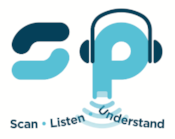What is The Big Book Talk (And What is it Telling Us?)
In 2022, Scanning Pens launched a new campaign all about reading and literacy.
The Big Book Talk is our way of encouraging reading in students and sparking vital conversations about literacy wherever it goes. At Scanning Pens, we’re dedicated to supporting reading skills and fostering literacy as part of our mission, but in 2022, we’ve decided to go further and really explore just what literacy can mean in real-word terms and what it looks like out there in the world as we recover from an unexpectedly disrupted period in our education history.
The numbers tell a story.
Data gathered from over 200 UK school sources suggests that 84% of students weren’t reading at age-appropriate levels at the start of 2021’s school year. In addition to this, 68% of teachers felt that their students were reading at least nine months below target; and 69% said that their school wasn’t properly equipped with the necessary toolkit to aid reading recovery. We also discovered through our liaisons with school leaders, staff and SENCOs that many students in Year 11 lack confidence in their reading and comprehension, and some feel apprehension towards the exam season ahead, in some part due to a lack of support in literacy studies and written and spoken English during the pandemic.
These statistics are fairly alarming – particularly when we consider that access to learning is underpinned by literacy. Reading is a core skill that’s of the utmost importance when it comes to developing so many different subject skill sets in education. That’s why it’s so worrying that 69% of the teachers that responded to the survey said that their school wasn’t properly equipped with a tool kit of reading supports to provide the necessary reading recovery.
And when we take a look at the lie of the land over the pond and examine our survey data from the US, the picture looks much the same.
So where do we go from here?
It’s difficult information to process, and educators are under large amounts of stress to implement a reading recovery and counteract the effects of pandemic learning in a short amount of time. However text-to-speech reading supports have been proven to help struggling readers to thrive, and support literacy at all levels of the curriculum. The ReaderPen is one of our most popular assistive reading tools because it’s a breakthrough in helping those with neurodiversity discover a love for reading. This portable and discreet device has a wealth of features to help remove the stigma surrounding dyslexia, giving people of all ages the confidence and independence to enjoy literacy in comfort - and it can be accessed via the new funding announced by the US Department of Education last week.
Reading is an area which desperately needs supporting after so many students have spent so long learning in non-ideal conditions. Many students- both those who have dyslexia and literacy differences, and those who do not- are reading below their expected level, and with exams on the horizon, this represents a challenge for both learners and educators alike.
EdTech devices, especially reading supports, can effect a huge boost to the education recovery effort in the US. They have the power to change the narrative and represent a vital source of confidence and a pathway to educational attainment for the students who use them. Scanning Pens’ ReaderPen and ExamReader combine award-winning text-to-speech technology with a simple and effective implementation, and the purchase of these supports can be funded using funds from ARP. You can discover these devices and learn more about how to access them using ARP funding at the US Funding Hub at Scanning Pens.









